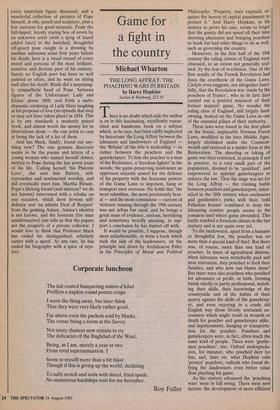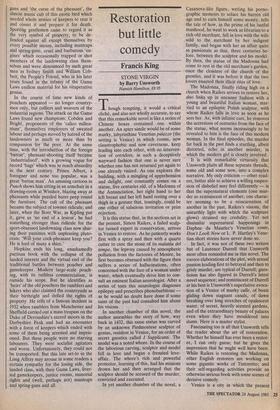Game for a fight in the country
Michael Wharton
THE LONG AFFRAY: THE POACHING WARS IN BRITAIN by Harry Hopkins
Seeker & Warburg, £12.95
There is no doubt which side the author is on in this fascinating, excellently resear- ched and handsome book on a subject which, as he says, has been oddly neglected by historians: the Long Affray between the labourers and landowners of England — the 'Britain' of the title is misleading — or rather between the poachers and the gamekeepers. To him the poacher is a man of the Resistance, a 'freedom fighter' in the woods; the game-preserving landowner an oppressor unjustly armed for the defence of his property with the fearsome powers of the Game Laws to imprison, hang or transport men overseas. He holds that 'the most relentless, the most persistently brut- al — and the most continuous — current of violence running through the 19th century was not urban but rural, and he brings a great mass of evidence, curious, horrifying and sometimes weirdly amusing, to sup- port a conclusion he has started off with.
It would be possible, I suppose, though most unfashionable, to write a book which took the side of the landowners, on the principle laid down by Archdeacon Paley in his Principles of Moral and Political Philosophy: 'Property, once exposed, re- quires the horror of capital punishment to protect it.' And Harry Hopkins, in his anxiety to prove his case, seems to forget that the gentry did not spend all their time shooting pheasants and bringing poachers to book but had other things to do as well, such as governing the country. Moreover, in the first half of the 19th century the ruling classes of England were obsessed, to an extent not generally real- ised, by the fear of revolution. One of the first results of the French Revolution had been the overthrow of the Game Laws. Carlyle even suggests, not altogether fanci- fully, that the Revolution was 'made by the poachers of France', who in its first days carried out a positive massacre of their former masters' game. No wonder the ruling class of England, still largely land- owning, looked on the Game Laws as one of the essential pillars of their authority.
These laws were based in the first place on the brutal, implacable Norman Forest Laws, modified in the later Middle Ages, largely abolished under the Common- wealth and restored in a milder form at the Restoration. The shooting or taking of game was then restricted, in principle if not in practice, to a very small part of the population, deemed to be 'qualified', and empowered to appoint gamekeepers to enforce the law. Thus the stage was set for the Long Affray — the running battle between poachers and gamekeepers, inten- sified in the 18th century when enclosures and gentlemen's parks with their 'cold Palladian houses' combined to deny the labouring country people access to the common land where game abounded. This battle reached a ferocious climax in the last century and is not quite over yet.
To the landowners, apart from a humane or thoughtful few, the poacher was no more than a special kind of thief. But there was, of course, more than one kind of poacher. In times of agricultural distress, when labourers were wretchedly paid and near starvation, they poached to feed their families, and who now can blame them? But there were also poachers who poached for adventure or profit, or both, forming bands wholly or partly professional, match- ing their skills, their knowledge of the countryside and of the habits of their quarry against the skills of the gamekeep- er, and even enjoying in a crude old English way those bloody nocturnal en- counters which might result in wounds or death for poacher and gamekeeper alike, and imprisonment, hanging or transporta- tion for the poacher. Poachers and gamekeepers were, in fact, often much the same kind of people. There were 'gentle- men poachers', too, Oxford undergradu- ates, for instance, who poached deer for fun; and, later on, what Hopkins calls 'protest' poachers, radicals who found de- fying the landowners even better value than pinching his game.
As the century advanced the 'poaching wars' were in full swing. There were new factors: the development of more efficient guns and 'the curse of the pheasant', the almost manic cult of this exotic bird which needed whole armies of keepers to rear it and cosset it and prepare it for death. Sporting gentlemen came to regard it as the very symbol of property, to be de- fended against all except themselves by every possible means, including mantraps and spring-guns, cruel and barbarous 'en- gines' which occasionally trapped or shot members of the landowning class them- selves and were denounced by such great men as Sydney Smith and William Cob- bett, the People's Friend, who in his later years found in the infamy of the Game Laws endless material for his vituperative genius.
In the course of time new kinds of poachers appeared — no longer country- men only, but colliers and weavers of the industrial regions. The attack on the Game Laws found new champions: Cobden and Bright, proponents of the 'calico millen- nium', themselves employers of sweated labour and perhaps moved by hatred of the landowners as much or more than by compassion for the poor. At the same time, with the introduction of the foreign `battue', pheasant-shooting itself became 'industrialised', with a growing vogue for record 'bags' which was to reach absurdity in the next century. Prince Albert, a foreigner and none too popular, was a great %antic man'. An amusing cartoon in Punch shows him sitting in an armchair in a drawing-room at Windsor, blazing away at pheasants while puzzled hares peep round the furniture. The cult of the pheasant became the subject of townee ridicule; and later, when the Boer War, as Kipling put it, gave us 'no end of a lesson', he had something stronger than ridicule for the sport-obsessed landowning class now shar- ing their pastimes with unpleasing pluto- crats: 'Will your cock-pheasant keep you? He is lord of many a shire.'
Hopkins ends his long, unashamedly partisan book with the collapse of the landed interest and the virtual end of the traditional battles between poacher and gamekeeper. Modern large-scale poach- ing, with its ruthless commercialism, is outside his scope. But he identifies as 'heirs' of the old poachers the ramblers and hikers who also claimed the countryside as their birthright and defied the rights of property. He tells of a famous incident in 1932 when ramblers from Manchester and Sheffield carried out a mass trespass on the Duke of Devonshire's sacred moors in the Derbyshire Peak and had an encounter with a force of keepers which ended with some of them being arrested and impris- oned. But these people were no starving labourers. They were socialist agitators and worse. Unfortunately, they could not be transported. But this late set-to in the Long Affray may arouse in some readers a certain sympathy for the losing side, the landed class, with their Game Laws, liver- ied gamekeepers, justice rooms, manorial rights and (well, perhaps not) mantraps and spring-guns and all.











































 Previous page
Previous page